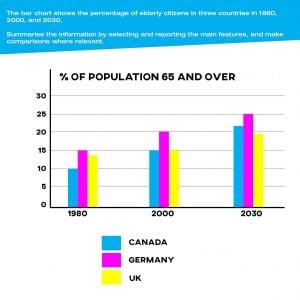This is an IELTS writing task 2 sample answer essay on the topic of the benefits and disadvantages of competition in university from the real IELTS exam.
Tricky two-part question!
Please consider supporting me on Patreon.com/howtodoielts to receive my exclusive IELTS Ebooks!
Dave
IELTS Essay: Governments Helping
Competition for university study is becoming increasingly strong.
Why are universities becoming more competitive?
Is this a positive or negative development?
In recent decades, there has been a rise in competitive admission rates for universities. In my opinion, this is largely due to improving income equality and is a positive trend on the whole.
The main cause of this phenomenon is a growth in the global middle class. In developed countries, education levels have been rising steadily since the beginning of the 20th century with diminishing returns as countries reach 90% and above. Therefore, the most significant increases now come from the developing world. In particular, Asian and Middle Eastern nations such as Vietnam, Malaysia, and the UAE have seen dramatic growth in per capita income, enabling families to send their children to university domestically or abroad. Coupled with increased tax revenue this allows governments to fund state schools and offer scholarships and grants to less privileged segments of the population. Larger applicant pools from around the world are concomitant with increased competition.
Despite the risk that less affluent families will be left behind, fiercer competition is an overwhelming positive. When a large number of applicants compete for limited number of spots, this motivates each individual to excel. For example, a student applying to Harvard University in the 1950s was competing against a limited number of other applications and could likely rely on wealth and social status to gain acceptance. Nowadays, the acceptance rate is below 5% as students from all over the world strive for a place at Harvard. This means students must work harder to differentiate themselves by taking on more meaningful extracurriculars, receiving higher grades, and writing more insightful college essays. All this hard work in the aggregate translates to personal growth even if they must settle for a lesser university.
In conclusion, rising incomes globally are responsible for increased competitiveness for university education and this clearly benefits both individuals and society. However, it is also important that governments and families mitigate the potentially negative effects of competition.
Analysis
1. In recent decades, there has been a rise in competitive admission rates for universities. 2. In my opinion, this is largely due to improving income equality and is a positive trend on the whole.
- Paraphrase the overall essay topic.
- Write a clear opinion. Read more about introductions here.
1. The main cause of this phenomenon is a growth in the global middle class. 2. In developed countries, education levels have been rising steadily since the beginning of the 20th century with diminishing returns as countries reach 90% and above. 3. Therefore, the most significant increases now come from the developing world. 4. In particular, Asian and Middle Eastern nations such as Vietnam, Malaysia, and the UAE have seen dramatic growth in per capita income, enabling families to send their children to university domestically or abroad. 5. Coupled with increased tax revenue this allows governments to fund state schools and offer scholarships and grants to less privileged segments of the population. 6. Larger applicant pools from around the world are concomitant with increased competition.
- Write a topic sentence with a clear main idea at the end.
- Explain your main idea.
- Develop it with specific examples.
- Keep developing it fully.
- Stay focused on the same main idea.
- Finish by linking it back to the main idea.
1. Despite the risk that less affluent families will be left behind, fiercer competition is an overwhelming positive. 2. When a large number of applicants compete for limited number of spots, this motivates each individual to excel. 3. For example, a student applying to Harvard University in the 1950s was competing against a limited number of other applications and could likely rely on wealth and social status to gain acceptance. 4. Nowadays, the acceptance rate is below 5% as students from all over the world strive for a place at Harvard. 5. This means students must work harder to differentiate themselves by taking on more meaningful extracurriculars, receiving higher grades, and writing more insightful college essays. 6. All this hard work in the aggregate translates to personal growth even if they must settle for a lesser university.
- Write a new topic sentence with a new main idea at the end.
- Explain your new main idea.
- Include specific details and examples.
- Continue developing it…
- as fully as possible!
- Any extra statement of the result will help.
1. In conclusion, rising incomes globally are responsible for increased competitiveness for university education and this clearly benefits both individuals and society. 2. However, it is also important that governments and families mitigate the potentially negative effects of competition.
- Summarise your main ideas.
- Include a final thought. Read more about conclusions here.
Vocabulary
What do the words in bold below mean? Make some notes on paper to aid memory and then check below.
In recent decades, there has been a rise in competitive admission rates for universities. In my opinion, this is largely due to improving income equality and is a positive trend on the whole.
The main cause of this phenomenon is a growth in the global middle class. In developed countries, education levels have been rising steadily since the beginning of the 20th century with diminishing returns as countries reach 90% and above. Therefore, the most significant increases now come from the developing world. In particular, Asian and Middle Eastern nations such as Vietnam, Malaysia, and the UAE have seen dramatic growth in per capita income, enabling families to send their children to university domestically or abroad. Coupled with increased tax revenue this allows governments to fund state schools and offer scholarships and grants to less privileged segments of the population. Larger applicant pools from around the world are concomitant with increased competition.
Despite the risk that less affluent families will be left behind, fiercer competition is an overwhelming positive. When a large number of applicants compete for limited number of spots, this motivates each individual to excel. For example, a student applying to Harvard University in the 1950s was competing against a limited number of other applications and could likely rely on wealth and social status to gain acceptance. Nowadays, the acceptance rate is below 5% as students from all over the world strive for a place at Harvard. This means students must work harder to differentiate themselves by taking on more meaningful extracurriculars, receiving higher grades, and writing more insightful college essays. All this hard work in the aggregate translates to personal growth even if they must settle for a lesser university.
In conclusion, rising incomes globally are responsible for increased competitiveness for university education and this clearly benefits both individuals and society. However, it is also important that governments and families mitigate the potentially negative effects of competition.
Answers
recent decades the last 20 or 30 years
rise growth
competitive admission rates harder to get into
largely due to mostly because of
improving income equality people earning more money
positive trend on the whole good overall
phenomenon trend
growth increase
global middle class people around the world earning decent salaries
developed countries rich nations
education levels how much schooling someone has
steadily at regular intervals
20th century 1900-2000
diminishing returns the rates of growth slow
reach 90% and above between 90 and 100%
significant meaningful
developing world poorer parts of the world
seen dramatic growth undergone a lot of positive change
per capita income the amount earned per person
enabling allowing for
domestically in one’s country
abroad in other countries
coupled with combined with
tax revenue money people pay the government
fund state schools give money to government schools
scholarships money for academic excellence
grants money the government gives students that they don’t have to pay back
less privileged segments of the population poorer people
larger applicant pools more total people applying
are concomitant with happen at the same time as a result
despite regardless of
risk threat
less affluent families poorer families
left behind neglected
fiercer more intense
applicants people who apply
motivates encourages
excel do really well
limited contained
applications what you send to apply
rely on depend on
wealth money
social status standing in society
gain acceptance get into
acceptance rate number of people admitted
differentiate separate yourself
taking on join
meaningful extracurriculars good activities outside school
insightful meaningful, smart
in the aggregate combined
translates to means
personal growth individual progress
even if regardless of
settle have to
lesser university not as good school
responsible for it is their duty
clearly benefits definitely good for
mitigate lessens the impact
potentially negative effects possible downsides
Pronunciation
Practice saying the vocabulary below and use this tip about Google voice search:
ˈriːsnt ˈdɛkeɪdz
raɪz
kəmˈpɛtɪtɪv ədˈmɪʃ(ə)n reɪts
ˈlɑːʤli djuː tuː
ɪmˈpruːvɪŋ ˈɪnkʌm i(ː)ˈkwɒlɪti
ˈpɒzətɪv trɛnd ɒn ðə həʊl
fɪˈnɒmɪnən
grəʊθ
ˈgləʊbəl ˈmɪdl klɑːs
dɪˈvɛləpt ˈkʌntriz
ˌɛdju(ː)ˈkeɪʃən ˈlɛvlz
ˈstɛdɪli
ˈtwɛntɪəθ ˈsɛnʧʊri
dɪˈmɪnɪʃɪŋ rɪˈtɜːnz
riːʧ 90% ænd əˈbʌv
sɪgˈnɪfɪkənt
dɪˈvɛləpɪŋ wɜːld
siːn drəˈmætɪk grəʊθ
pɜː ˈkæpɪtə ˈɪnkʌm
ɪˈneɪblɪŋ
dəʊˈmɛstɪk(ə)li
əˈbrɔːd
ˈkʌpld wɪð
tæks ˈrɛvɪnjuː
fʌnd steɪt skuːlz
ˈskɒləʃɪps
grɑːnts
lɛs ˈprɪvɪlɪʤd ˈsɛgmənts ɒv ðə ˌpɒpjʊˈleɪʃən
ˈlɑːʤər ˈæplɪkənt puːlz
ɑː kənˈkɒmɪtənt wɪð
dɪsˈpaɪt
rɪsk
lɛs ˈæflʊənt ˈfæmɪliz
lɛft bɪˈhaɪnd
ˈfɪəsə
ˈæplɪkənts
ˈməʊtɪveɪts
ɪkˈsɛl
ˈlɪmɪtɪd
ˌæplɪˈkeɪʃ(ə)nz
rɪˈlaɪ ɒn
wɛlθ
ˈsəʊʃəl ˈsteɪtəs
geɪn əkˈsɛptəns
əkˈsɛptəns reɪt
ˌdɪfəˈrɛnʃɪeɪt
ˈteɪkɪŋ ɒn
ˈmiːnɪŋfʊl ˌɛkstrəkəˈrɪkjʊləz
ˈɪnsaɪtf(ə)l
ɪn ði ˈægrɪgɪt
trænsˈleɪts tuː
ˈpɜːsnl grəʊθ
ˈiːvən ɪf
ˈsɛtl
ˈlɛsə ˌjuːnɪˈvɜːsɪti
rɪsˈpɒnsəbl fɔː
ˈklɪəli ˈbɛnɪfɪts
ˈmɪtɪgeɪt
pəʊˈtɛnʃəli ˈnɛgətɪv ɪˈfɛkts
Vocabulary Practice
I recommend getting a pencil and piece of paper because that aids memory. Then write down the missing vocabulary from my sample answer in your notebook:
In r_________________s, there has been a r___e in c__________________________s for universities. In my opinion, this is l_________y d_______o i__________________________y and is a p_______________________________e.
The main cause of this p________________n is a g________h in the g_______________________s. In d_________________s, e_________________s have been rising s__________y since the beginning of the 2____________y with d______________________s as countries r_____________________e. Therefore, the most s______________t increases now come from the d________________d. In particular, Asian and Middle Eastern nations such as Vietnam, Malaysia, and the UAE have s___________________h in p_______________e, e__________g families to send their children to university d_______________y or a_______d. C________________h increased t__________e this allows governments to f__________________s and offer s_______________s and g_______s to l_________________________________________n. L_________________s from around the world a_______________________h increased competition.
D_________e the r___k that l____________________s will be l___________d, f____________r competition is an overwhelming positive. When a large number of a____________s compete for limited number of spots, this m__________s each individual to e_______l. For example, a student applying to Harvard University in the 1950s was competing against a l_______d number of other a____________s and could likely r________n w______h and s____________s to g___________________e. Nowadays, the a________________e is below 5% as students from all over the world s_______e for a place at Harvard. This means students must work harder to d_____________e themselves by t_________n more m_____________________s, receiving higher grades, and writing more i____________l college essays. All this hard work i_____________________e t____________o p_______________h e_________f they must s_______e for a l_____________y.
In conclusion, rising incomes globally are r___________________r increased competitiveness for university education and this c______________________s both individuals and society. However, it is also important that governments and families m__________e the p________________________s of competition.
Listening Practice
Learn more about this topic in the video below and practice with these activities:
Reading Practice
Read more about this topic and use these ideas to practice:
Writing Practice
Practice with the same basic topic below and then check with my sample answer:
Full-time university students spend a lot of time studying. Some say they should do other activities too.
To what extent do you agree or disagree?







0 Comments